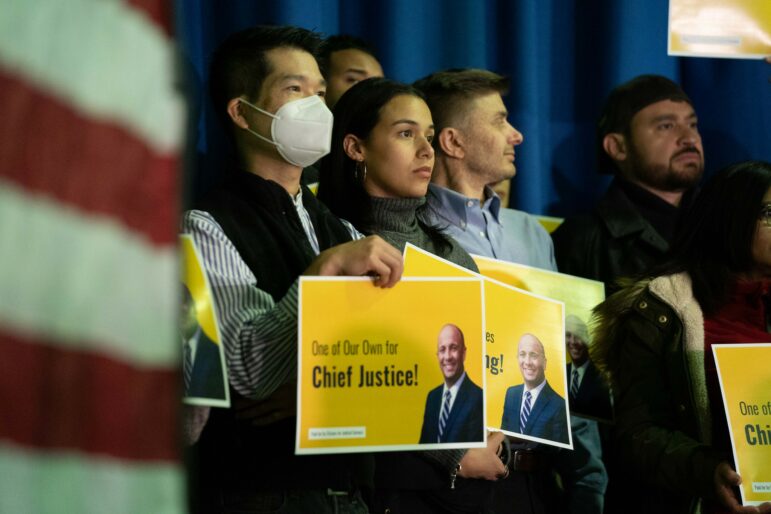“The notion of the law as something outside of politics has surely been put to rest by the recent Supreme Court confirmation processes and the right-wing decisions of that Court. Most Americans now agree: the nation’s highest court is in fact a political body.”

Don Pollard/Office of Governor Kathy Hochul
LaSalle supporters at a press conference with Gov. Kathy Hochul on Saturday.Since Gov. Kathy Hochul nominated Hector LaSalle to be Chief Judge of the New York Court of Appeals, a wide array of attorneys, unions, community groups, civil rights organizations and more have decried the pick as likely to cement a conservative majority on the court. Since then, LaSalle’s defenders, including lawyers and retired judges, have accused the judge’s critics of misreading his cases and tarnishing his reputation.
If you have been paying attention to judicial nominations the last six years, this might look familiar. When Donald Trump nominated Neil Gorsuch, Barack Obama’s solicitor general Neil Katyal insisted in the New York Times that liberals should back him. The Washington Post Editorial Board endorsed “making a deal” to confirm him.
Liberal “legal experts” reacted similarly when Brett Kavanaugh was nominated, such as when law professor Noah Feldman insisted that Kavanaugh was the “last hope” for abortion rights, and professor Akhil Amar wrote “A Liberal’s Case” in support of him. When Amy Coney Barrett was nominated, Feldman popped up again, trumpeting his liberal bona fides but saying whatever her views, she “deserved” to be on the Supreme Court. And once she was put on the Court, political science professor Evan Gerstmann comforted the left by saying “No, The Supreme Court Is Not About To Overrule Roe v. Wade.”
Over and over again, we’ve heard respectable legal commentators tell the public to ignore those who warn about a dangerous nominee. Each time the commentators are wrong, and spectacularly so. The Supreme Court’s opinion in Dobbs, overturning Roe v. Wade, was entirely predictable. And that’s to say nothing of its egregious decisions on gun rights, religion in public, the administrative state, and basic campaign finance regulations.
New Yorkers should consider this history when they read private attorneys, who represent some of the world’s largest corporations, argue that Justice LaSalle is “qualified,” or “mainstream” based on nothing other than vague descriptions of his personal qualities. Readers should be similarly skeptical when they read Professor Vincent Bonventre defend LaSalle as “moderate” and insist that his troubling anti-union and anti-abortion decisions can be explained away, without presenting evidence to the contrary. And the public can see what’s really going on when retired judges use words like “woke” to belittle the concerns of LaSalle’s opponents and claim he shouldn’t be held responsible for decisions he’s joined.
Judges are enormously powerful figures in this country and state. That is especially true for someone like New York’s Chief Judge, who takes on a wide array of administrative duties in addition to issuing opinions. With that power comes a kind of “judge worship,” in which members of the extremely hierarchical legal community are loath to criticize members of their own profession. This behavior can be driven by self-interest and politics (as is the case of many LaSalle boosters hypocritically complaining about political opposition), but just as often, it is driven by a misguided belief about how the law works in this country.
When my generation attended law school, 10 to 20 years ago, we were taught the law was practically sacred, a rarefied intellectual plane that lived above politics. Even then that premise seemed questionable in the aftermath of Bush v. Gore. But the notion of the law as something outside of politics has surely been put to rest by the recent Supreme Court confirmation processes and the right-wing decisions of that Court. Most Americans now agree: the nation’s highest court is in fact a political body.
The public had paid less attention to New York’s highest court until recently. Two developments have changed that. First, state courts are increasingly being understood as bastions of defense against an increasingly conservative and aggressive federal court system. Second, the Court of Appeals’ troubling ruling in New York’s redistricting case usurped control of the congressional redistricting process from the Legislature and handed it to an unelected special master, helping Republicans narrowly retake the House of Representatives majority.
Rigorous public debate about Justice LaSalle’s record is a good thing. The public should know the judicial history of New York State’s potential top jurist. LaSalle supporters insist the best way to do that is through the upcoming Senate Judiciary Committee hearing, despite years of highly scripted U.S. Supreme Court hearings that misled the public about nominees’ conservative leanings.
How LaSalle acted when in a position of power is the best predictor for how he will act when given more power. Whatever his allies tell you to think, focus on LaSalle’s broad record. New York can do better.
Janos Marton is the Justice Director for Dream.Org, a national social justice organization. He is a longtime New York attorney and a past candidate for Manhattan District Attorney.








